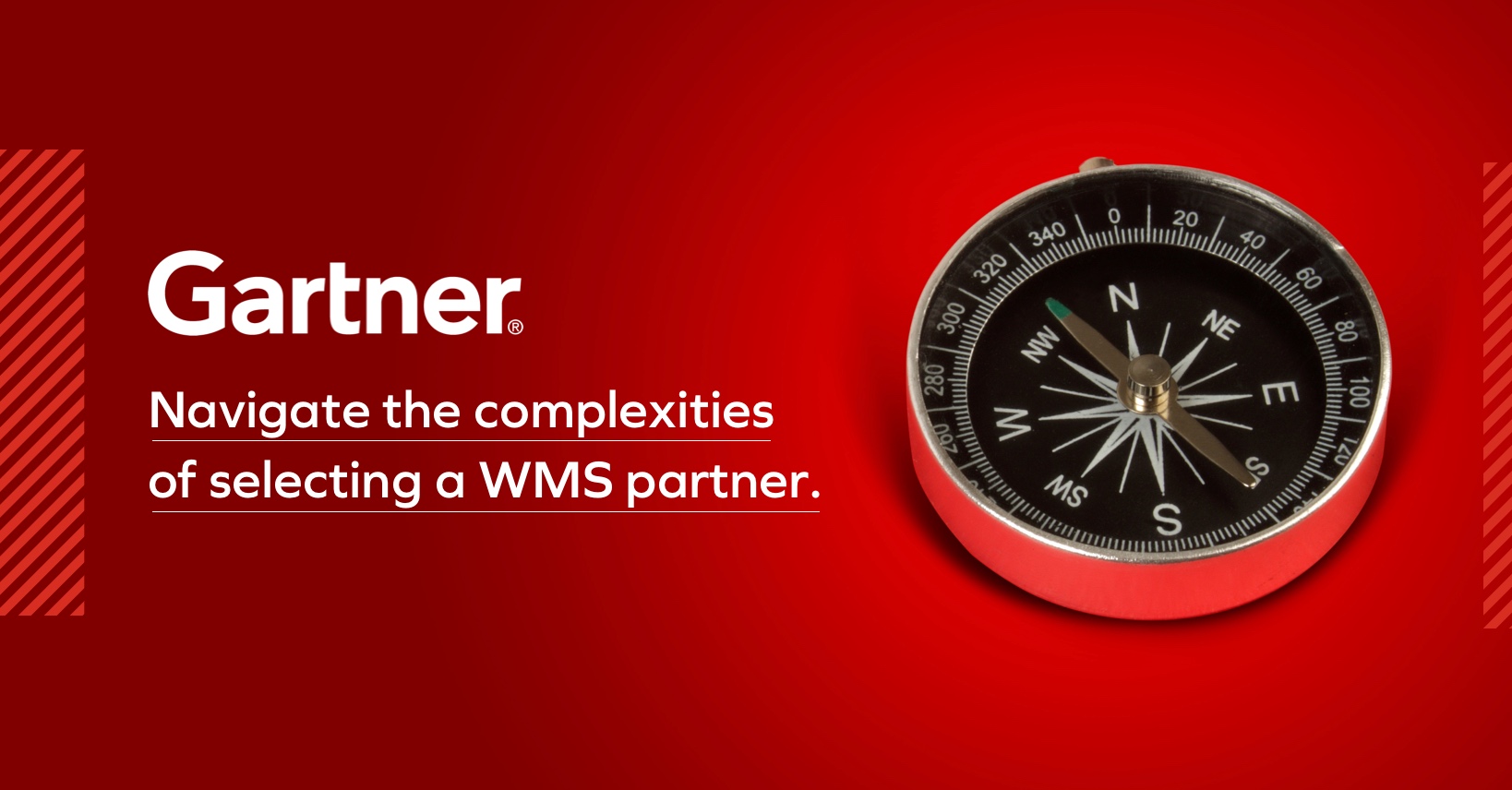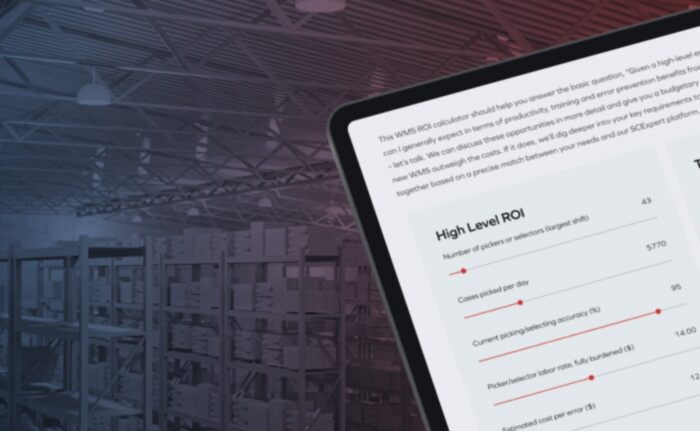
Finding and implementing the best WMS for your business is a large undertaking that requires a whole lot of research and diligence. If you’re searching for a new WMS, a great place to start information gathering is by reviewing the latest Gartner® Magic Quadrant™ for Warehouse Management Systems (WMS). The research in the report offers a great way to gain an understanding of the current state of the WMS market. Here’s what you can expect.
- Market Definition and Explanation
- Multiple WMS Vendors Evaluated
- The Best WMS for Each Business Need
- Conclusion
Market Definition and Explanation
The Gartner report starts by defining a WMS as “a software application that helps manage and intelligently execute the operations of a warehouse, distribution center (DC) or fulfillment center (FC).”
It outlines a list of core capabilities offered by WMS applications. This list includes: receiving, inspection/quality, put-away, cross-docking, stock locating, inventory management, location management, replenishment, order allocation, order picking, wave planning/management, staging, packing, truck loading, manifesting, cycle counting, shipping and automated material handling equipment (MHE) interfaces.
Optional WMS capabilities are also listed. These include: workforce/labor management, task interleaving, slotting, yard management, dock appointment scheduling, voice picking, parcel manifesting, value-added services such as light manufacturing/kitting, and third-party logistics (3PL) billing.
All solutions in the Magic Quadrant support basic core WMS capabilities. Many also support various levels of extended WMSs.
Multiple WMS Vendors Evaluated
The 2024 Magic Quadrant for Warehouse Management Systems highlights 20 vendors, providing a graphical analysis and a consistent set of evaluation criteria. This framework helps you assess how well technology providers are executing their stated visions and performing based on Gartner analysts’ market perspective. The report categorizes vendors as Leaders, Visionaries, Niche Players, and Challengers, offering insights to help you identify which provider aligns with your specific business goals, needs, and priorities.
The Best WMS for Each Business Need
As you search for a WMS, it’s important to note that a vendor’s strong performance in the Magic Quadrant doesn’t necessarily mean it’s the best fit for your organization. The best WMS for you isn’t simply the one that scores highest in industry research—it’s the one that effectively addresses the unique challenges of your business and operations. Every industry has its own distinct requirements, and identifying the right solution involves aligning those needs with the capabilities of the system.
Here are some key requirements to consider by industry:
The Best WMS for Consumer Goods Companies
Consumer Goods companies require a WMS that provides real-time inventory visibility to track stock levels and minimize shortages. It must support high-volume processing and handle seasonal peaks and demand surges seamlessly. Integration with warehouse automation is essential to streamline picking, packing, shipping, and reporting processes, ensuring efficiency and accuracy.
The Best WMS For eCommerce Fulfillment
In e-commerce, a WMS is essential for efficient order management, enabling companies to aggregate and organize shipments based on various factors like size, destination, and priority. The system streamlines fulfillment by optimizing picking, packing, and shipping processes, ensuring timely delivery to customers. A robust WMS also plays a key role in managing returns, refunds, replacements, and restocking, reducing manual intervention and improving operational efficiency.
The Best WMS For Food & Beverage Companies
Food and beverage companies depend on a WMS to meet stringent regulatory requirements and ensure product quality. The system must offer robust record-keeping, lot and expiration date tracking, and integration with advanced sensors to maintain product freshness and compliance. A strong WMS also provides full traceability for recalls and regulatory audits, offering peace of mind in case of an issue. Additionally, it should seamlessly integrate with automated systems to optimize workflows, enabling high-speed order processing and efficient delivery, which are crucial for maintaining supply chain performance in this fast-paced industry.
The Best WMS for Manufacturers
Manufacturers rely on a WMS to streamline operations and maintain control from raw material storage to finished product delivery. With real-time inventory visibility, manufacturers can track materials across every stage—raw, in-process, and finished—ensuring seamless production workflows. Lot and batch tracking are critical for compliance with industry regulations and maintaining traceability. A robust WMS also helps optimize production efficiency, reduce waste, and ensure on-time delivery, ultimately improving overall supply chain performance.
The Best WMS for Retailers
For retail businesses, the most crucial feature of a WMS is real-time inventory tracking across multiple locations to prevent stockouts and overstocks. Seamless integration with the point-of-sale (POS) system is essential to ensure accurate order processing and fulfillment. Retailers also need a WMS that offers advanced reporting, scalability, and robust support for omnichannel operations, including in-store pickups and online orders.
The Best WMS for 3PLs
3PLs require a WMS that efficiently manages multiple clients’ inventory within a single system, ensuring seamless multi-client operations. Real-time visibility into inventory and order status is essential, along with a highly customizable system to meet the diverse demands of various industries and clients. Additionally, a robust billing and reporting functionality is crucial for managing the complex billing structures that 3PLs often face, ensuring accurate and timely invoicing for each customer served.
The Best WMS for Wholesale Distributors
Wholesale distributors need a WMS that offers comprehensive inventory management, real-time stock tracking, and efficient order processing to ensure smooth operations. The system should also support the management of inbound and outbound logistics, facilitating streamlined supply chain operations. Furthermore, a flexible WMS helps wholesale distributors adapt to fluctuating demand and business growth across multiple locations, ensuring scalability and operational efficiency.
Conclusion
Finding and implementing the best WMS for your business is a significant undertaking that requires thorough research and careful consideration. The Gartner® Magic Quadrant™ for Warehouse Management Systems offers valuable insights and evaluations to help guide your decision. Made4net is proud to be recognized in the Gartner Magic Quadrant for nine consecutive years. We invite you to download a complimentary copy of the latest Gartner report here. As you explore your WMS options, it’s crucial to select a WMS that aligns with the specific needs of your industry. We encourage you to check out our case studies and videos to learn more about Made4net’s expertise, and feel free to reach out to speak with one of our experts.
Disclaimer:
Gartner, Magic Quadrant for Warehouse Management Systems, Simon Tunstall, Dwight Klappich, Rishabh Narang, Federica Stufano, May 2, 2024.
GARTNER is a registered trademark and service mark of Gartner, Inc. and/or its affiliates in the U.S. and internationally, and MAGIC QUADRANT is a registered trademark of Gartner, Inc. and/or its affiliates and are used herein with permission. All rights reserved.
Gartner does not endorse any vendor, product or service depicted in its research publications, and does not advise technology users to select only those vendors with the highest ratings or other designation. Gartner research publications consist of the opinions of Gartner’s research organization and should not be construed as statements of fact. Gartner disclaims all warranties, expressed or implied, with respect to this research, including any warranties of merchantability or fitness for a particular purpose.


